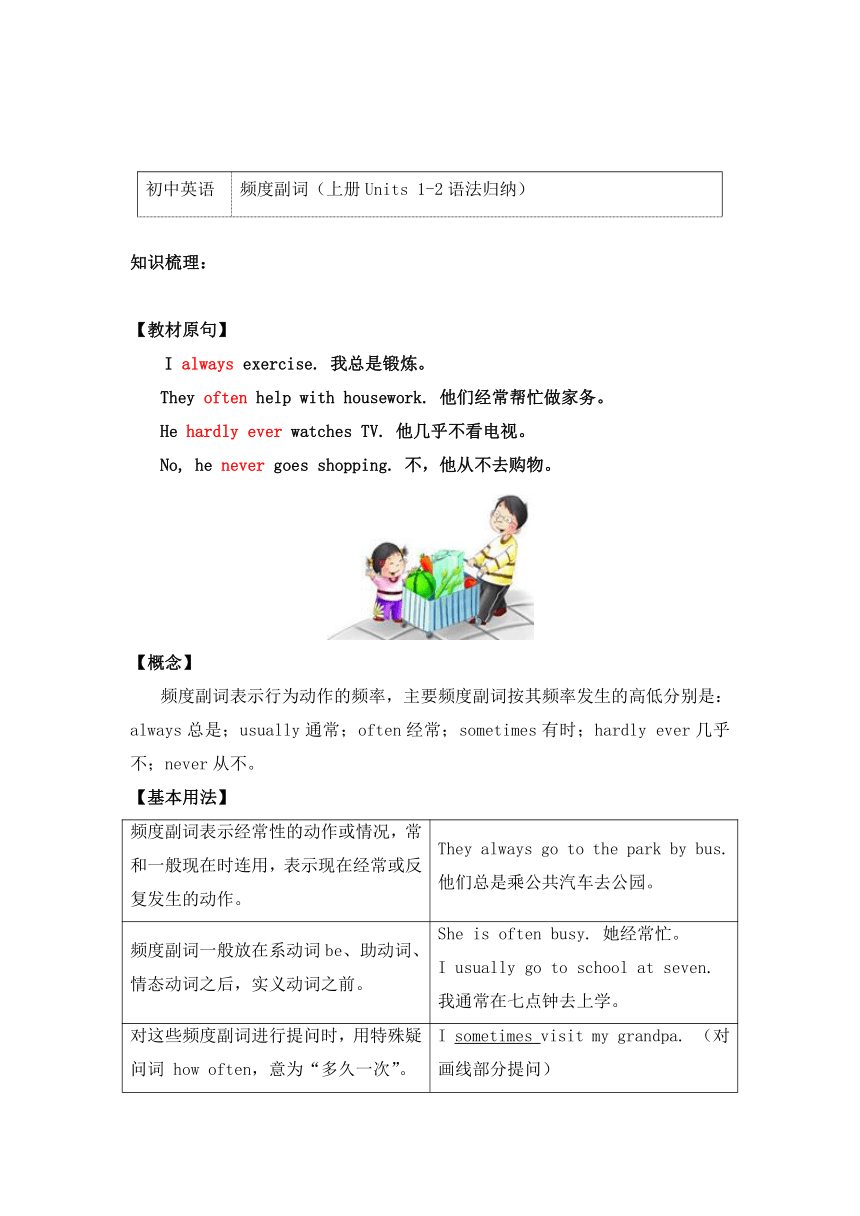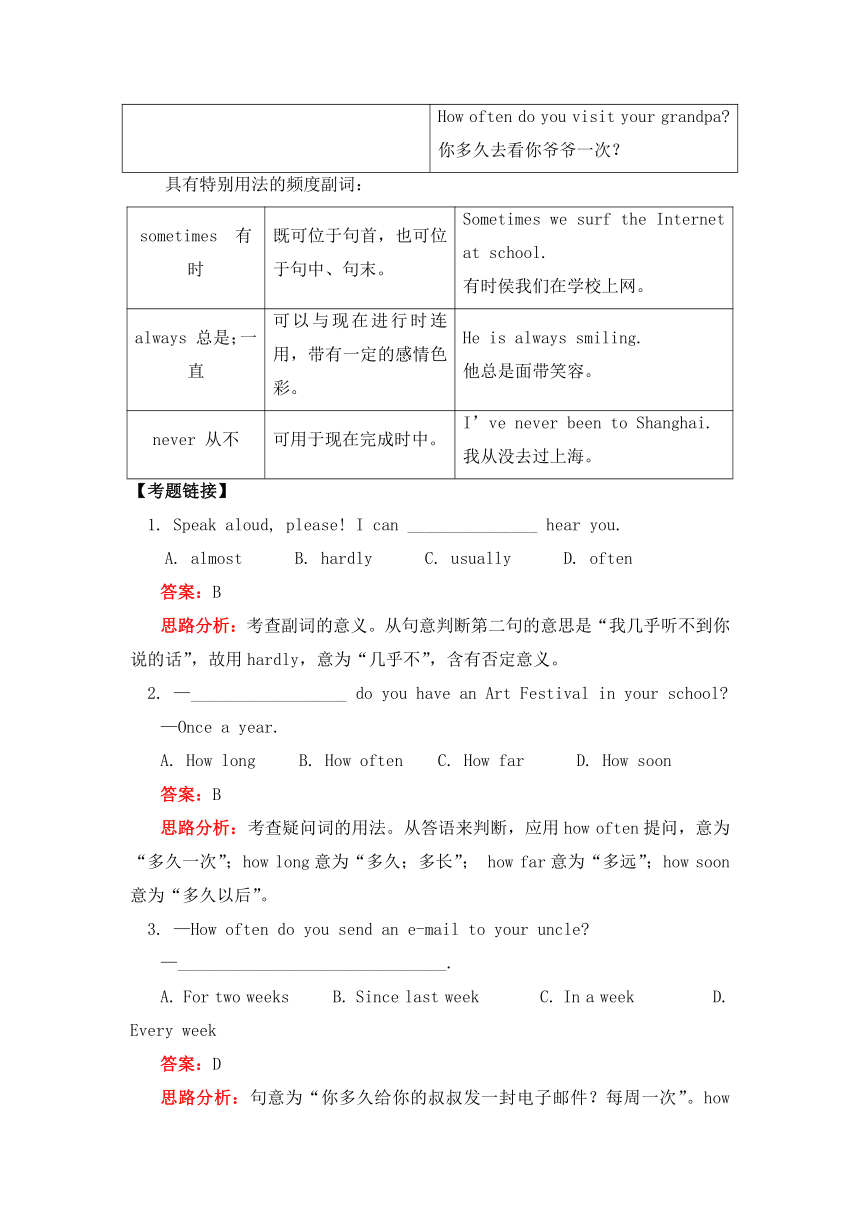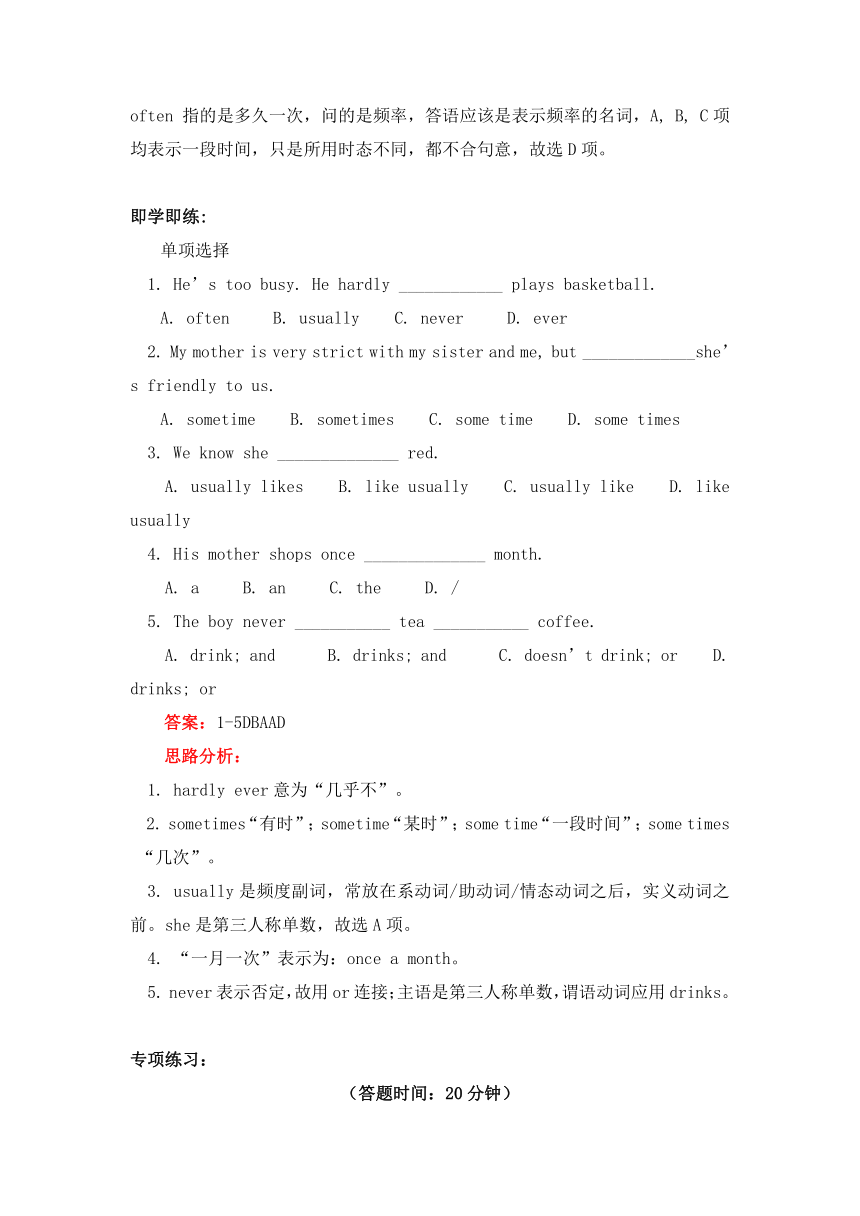人教新目标版英语八年级上册知识讲义频度副词(Units 1-2语法归纳)含答案解析
文档属性
| 名称 | 人教新目标版英语八年级上册知识讲义频度副词(Units 1-2语法归纳)含答案解析 |

|
|
| 格式 | doc | ||
| 文件大小 | 77.0KB | ||
| 资源类型 | 教案 | ||
| 版本资源 | 人教新目标(Go for it)版 | ||
| 科目 | 英语 | ||
| 更新时间 | 2020-09-11 00:00:00 | ||
图片预览



文档简介
初中英语 频度副词(上册Units 1-2语法归纳)
知识梳理:
【教材原句】
I always exercise. 我总是锻炼。
They often help with housework. 他们经常帮忙做家务。
He hardly ever watches TV. 他几乎不看电视。
No, he never goes shopping. 不,他从不去购物。
【概念】
频度副词表示行为动作的频率,主要频度副词按其频率发生的高低分别是:always总是;usually通常;often经常;sometimes有时;hardly ever几乎不;never从不。
【基本用法】
频度副词表示经常性的动作或情况,常和一般现在时连用,表示现在经常或反复发生的动作。 They always go to the park by bus.
他们总是乘公共汽车去公园。
频度副词一般放在系动词be、助动词、情态动词之后,实义动词之前。 She is often busy. 她经常忙。
I usually go to school at seven.
我通常在七点钟去上学。
对这些频度副词进行提问时,用特殊疑问词 how often,意为“多久一次”。 I sometimes visit my grandpa. (对画线部分提问)
How often do you visit your grandpa?
你多久去看你爷爷一次?
具有特别用法的频度副词:
sometimes 有时 既可位于句首,也可位于句中、句末。 Sometimes we surf the Internet at school.
有时侯我们在学校上网。
always 总是;一直 可以与现在进行时连用,带有一定的感彩。 He is always smiling.
他总是面带笑容。
never 从不 可用于现在完成时中。 I’ve never been to Shanghai.
我从没去过上海。
【考题链接】
1. Speak aloud, please! I can _______________ hear you.
A. almost B. hardly C. usually D. often
答案:B
思路分析:考查副词的意义。从句意判断第二句的意思是“我几乎听不到你说的话”,故用hardly,意为“几乎不”,含有否定意义。
2. —__________________ do you have an Art Festival in your school?
—Once a year.
A. How long B. How often C. How far D. How soon
答案:B
思路分析:考查疑问词的用法。从答语来判断,应用how often提问,意为“多久一次”;how long意为“多久;多长”; how far意为“多远”;how soon意为“多久以后”。
3. —How often do you send an e-mail to your uncle?
—_______________________________.
A. For two weeks B. Since last week C. In a week D. Every week
答案:D
思路分析:句意为“你多久给你的叔叔发一封电子邮件?每周一次”。how often 指的是多久一次,问的是频率,答语应该是表示频率的名词,A, B, C项均表示一段时间,只是所用时态不同,都不合句意,故选D项。
即学即练:
单项选择
1. He’s too busy. He hardly ____________ plays basketball.
A. often B. usually C. never D. ever
2. My mother is very strict with my sister and me, but _____________she’s friendly to us.
A. sometime B. sometimes C. some time D. some times
3. We know she ______________ red.
A. usually likes B. like usually C. usually like D. like usually
4. His mother shops once ______________ month.
A. a B. an C. the D. /
5. The boy never ___________ tea ___________ coffee.
A. drink; and B. drinks; and C. doesn’t drink; or D. drinks; or
答案:1-5DBAAD
思路分析:
1. hardly ever意为“几乎不”。
2. sometimes“有时”;sometime“某时”;some time“一段时间”;some times“几次”。
3. usually是频度副词,常放在系动词/助动词/情态动词之后,实义动词之前。she是第三人称单数,故选A项。
4. “一月一次”表示为:once a month。
5. never表示否定,故用or连接;主语是第三人称单数,谓语动词应用drinks。
专项练习:
(答题时间:20分钟)
Ⅰ. 单项选择
1. —Would you like to have _____________cake?
—No, thanks. I’ve had two. That’s enough.
A. other B. others C. another D. the other
2. Several years ago, ______________ people knew Sean. But now he is famous in Jinan.
A. few B. any C. many D. most
3. —Oh, you’re reading a newspaper. Is there _____________ in it?
—I don’t know. I read it just now.
A. new nothing B. anything new C. something new D. new anything
4. ______________of the hats suited him, so Jack has to try on the third one.
A. Neither B. Either C. Both D. All
5. —How many students like this song?
—_________________ of us likes it. It sounds terrible.
A. None B. Nobody C. Every one D. All
6. Would you like _____________________for super?
A. something Chinese B. Chinese something
C. anything Chinese D. Chinese anything
7. There’s still milk in the glass. Let the baby have it.
A. little B. a little C. a few D. few
8. —_______________________________________
—She sometimes does some shopping.
A. What does Lisa do on weekends? B. What’s Lisa?
C. When does Lisa shop? D. How often does Lisa drink coffee?
9. —How often does your mother exercise?
—____________________.
A. Once a week B. Three times C. Today D. For a week
10. On Sunday he sometimes _________ his clothes and sometimes _________ some shopping.
A. wash; do B. is washing; is doing C. washes; does D. washes; do
11. The twins usually _______ milk and bread for breakfast, but Jim ______ some coffee for it.
A. have; have B. have; has C. has; have D. has; has
12. Wang Mei __________ music and often ____________ to music.
A. like; listen B. likes; listens C. like; are listening D. liking; listen
13. John is always ________________ others.
A. help B. helping C. helps D. to help
14. His father __________________ watch TV in the evening.
A. usually doesn’t B. doesn’t usually C. usually D. never
答案:
Ⅰ. 1. C 解析:other前有the, this, some, any, each, every, no, one 以及形容词性物主代词时,其后就可接单数名词,而本题中没有,故A项错误;B项others后不能接名词,而空后有名词cake,故排除;D项表示“两者中的另一个”,也不符合句意。故只有C项合适,表示不确定数目中的另一个。句意为“—你想再吃块蛋糕吗?—不了,谢谢。我已吃了两个。够了”。
2. A 解析:根据后半句句意“但是现在在济南他很著名”可知“好几年以前,几乎没人认识Sean”。people是单数形式,复数概念,故其前用表示否定意义的few。
3. B 解析:不定代词的定语应该后置,故排除A项;在一般疑问句中,通常把something改为anything,故选B项。
4. A 解析:neither意为“两者都不”;either意为“两者中的任何一个”;both意为“两者都”;all意为“三者或三者以上都”。根据后半句句意“所以杰克不得不试戴第三顶”可知“两顶帽子都不适合他”。故选A项。
5. A 解析:浏览各选项可知B项不能与of短语连用,故排除;根据答语中的谓语动词是单数可排除D项;根据句意“听起来很糟糕”可知“我们没人喜欢”,故选A项。
6. A 解析:包含would like的一般疑问句表示的是一种建议,故不用把something变为anything,排除C、D两项;修饰something的定语要后置,排除B项。
7. B 解析:milk是不可数名词,故排除C, D两项;根据句意“让这婴儿喝它”可知“有一点”,故用a little。
8. A 解析:根据答语“她有时候去购物”可知选项中只有A项符合。句意为“莉萨周末做什么?”
9. A 解析:提问频度时,用表示频度的副词或短语,故A项正确。
10. C 解析:sometimes是一般现在时的标志词,主语he是第三人称单数,故谓语动词用第三人称单数形式,选项C正确。
11. B 解析:usually是一般现在时的标志词,the twins意为“双胞胎”,故谓语动词用原形;Jim是第三人称单数,故谓语动词用第三人称单数形式。
12. B 解析:主语是第三人称单数,故谓语动词用第三人称单数形式。
13. B 解析:always前有助动词is,故其后用现在分词形式,构成现在进行时,含有一定的感彩。
14. B 解析:因为主语是第三人称单数,故谓语动词在肯定句中用第三人称单数形式,排除C, D两项;usually常置于助动词之后,实义动词之前,故B项正确。
知识梳理:
【教材原句】
I always exercise. 我总是锻炼。
They often help with housework. 他们经常帮忙做家务。
He hardly ever watches TV. 他几乎不看电视。
No, he never goes shopping. 不,他从不去购物。
【概念】
频度副词表示行为动作的频率,主要频度副词按其频率发生的高低分别是:always总是;usually通常;often经常;sometimes有时;hardly ever几乎不;never从不。
【基本用法】
频度副词表示经常性的动作或情况,常和一般现在时连用,表示现在经常或反复发生的动作。 They always go to the park by bus.
他们总是乘公共汽车去公园。
频度副词一般放在系动词be、助动词、情态动词之后,实义动词之前。 She is often busy. 她经常忙。
I usually go to school at seven.
我通常在七点钟去上学。
对这些频度副词进行提问时,用特殊疑问词 how often,意为“多久一次”。 I sometimes visit my grandpa. (对画线部分提问)
How often do you visit your grandpa?
你多久去看你爷爷一次?
具有特别用法的频度副词:
sometimes 有时 既可位于句首,也可位于句中、句末。 Sometimes we surf the Internet at school.
有时侯我们在学校上网。
always 总是;一直 可以与现在进行时连用,带有一定的感彩。 He is always smiling.
他总是面带笑容。
never 从不 可用于现在完成时中。 I’ve never been to Shanghai.
我从没去过上海。
【考题链接】
1. Speak aloud, please! I can _______________ hear you.
A. almost B. hardly C. usually D. often
答案:B
思路分析:考查副词的意义。从句意判断第二句的意思是“我几乎听不到你说的话”,故用hardly,意为“几乎不”,含有否定意义。
2. —__________________ do you have an Art Festival in your school?
—Once a year.
A. How long B. How often C. How far D. How soon
答案:B
思路分析:考查疑问词的用法。从答语来判断,应用how often提问,意为“多久一次”;how long意为“多久;多长”; how far意为“多远”;how soon意为“多久以后”。
3. —How often do you send an e-mail to your uncle?
—_______________________________.
A. For two weeks B. Since last week C. In a week D. Every week
答案:D
思路分析:句意为“你多久给你的叔叔发一封电子邮件?每周一次”。how often 指的是多久一次,问的是频率,答语应该是表示频率的名词,A, B, C项均表示一段时间,只是所用时态不同,都不合句意,故选D项。
即学即练:
单项选择
1. He’s too busy. He hardly ____________ plays basketball.
A. often B. usually C. never D. ever
2. My mother is very strict with my sister and me, but _____________she’s friendly to us.
A. sometime B. sometimes C. some time D. some times
3. We know she ______________ red.
A. usually likes B. like usually C. usually like D. like usually
4. His mother shops once ______________ month.
A. a B. an C. the D. /
5. The boy never ___________ tea ___________ coffee.
A. drink; and B. drinks; and C. doesn’t drink; or D. drinks; or
答案:1-5DBAAD
思路分析:
1. hardly ever意为“几乎不”。
2. sometimes“有时”;sometime“某时”;some time“一段时间”;some times“几次”。
3. usually是频度副词,常放在系动词/助动词/情态动词之后,实义动词之前。she是第三人称单数,故选A项。
4. “一月一次”表示为:once a month。
5. never表示否定,故用or连接;主语是第三人称单数,谓语动词应用drinks。
专项练习:
(答题时间:20分钟)
Ⅰ. 单项选择
1. —Would you like to have _____________cake?
—No, thanks. I’ve had two. That’s enough.
A. other B. others C. another D. the other
2. Several years ago, ______________ people knew Sean. But now he is famous in Jinan.
A. few B. any C. many D. most
3. —Oh, you’re reading a newspaper. Is there _____________ in it?
—I don’t know. I read it just now.
A. new nothing B. anything new C. something new D. new anything
4. ______________of the hats suited him, so Jack has to try on the third one.
A. Neither B. Either C. Both D. All
5. —How many students like this song?
—_________________ of us likes it. It sounds terrible.
A. None B. Nobody C. Every one D. All
6. Would you like _____________________for super?
A. something Chinese B. Chinese something
C. anything Chinese D. Chinese anything
7. There’s still milk in the glass. Let the baby have it.
A. little B. a little C. a few D. few
8. —_______________________________________
—She sometimes does some shopping.
A. What does Lisa do on weekends? B. What’s Lisa?
C. When does Lisa shop? D. How often does Lisa drink coffee?
9. —How often does your mother exercise?
—____________________.
A. Once a week B. Three times C. Today D. For a week
10. On Sunday he sometimes _________ his clothes and sometimes _________ some shopping.
A. wash; do B. is washing; is doing C. washes; does D. washes; do
11. The twins usually _______ milk and bread for breakfast, but Jim ______ some coffee for it.
A. have; have B. have; has C. has; have D. has; has
12. Wang Mei __________ music and often ____________ to music.
A. like; listen B. likes; listens C. like; are listening D. liking; listen
13. John is always ________________ others.
A. help B. helping C. helps D. to help
14. His father __________________ watch TV in the evening.
A. usually doesn’t B. doesn’t usually C. usually D. never
答案:
Ⅰ. 1. C 解析:other前有the, this, some, any, each, every, no, one 以及形容词性物主代词时,其后就可接单数名词,而本题中没有,故A项错误;B项others后不能接名词,而空后有名词cake,故排除;D项表示“两者中的另一个”,也不符合句意。故只有C项合适,表示不确定数目中的另一个。句意为“—你想再吃块蛋糕吗?—不了,谢谢。我已吃了两个。够了”。
2. A 解析:根据后半句句意“但是现在在济南他很著名”可知“好几年以前,几乎没人认识Sean”。people是单数形式,复数概念,故其前用表示否定意义的few。
3. B 解析:不定代词的定语应该后置,故排除A项;在一般疑问句中,通常把something改为anything,故选B项。
4. A 解析:neither意为“两者都不”;either意为“两者中的任何一个”;both意为“两者都”;all意为“三者或三者以上都”。根据后半句句意“所以杰克不得不试戴第三顶”可知“两顶帽子都不适合他”。故选A项。
5. A 解析:浏览各选项可知B项不能与of短语连用,故排除;根据答语中的谓语动词是单数可排除D项;根据句意“听起来很糟糕”可知“我们没人喜欢”,故选A项。
6. A 解析:包含would like的一般疑问句表示的是一种建议,故不用把something变为anything,排除C、D两项;修饰something的定语要后置,排除B项。
7. B 解析:milk是不可数名词,故排除C, D两项;根据句意“让这婴儿喝它”可知“有一点”,故用a little。
8. A 解析:根据答语“她有时候去购物”可知选项中只有A项符合。句意为“莉萨周末做什么?”
9. A 解析:提问频度时,用表示频度的副词或短语,故A项正确。
10. C 解析:sometimes是一般现在时的标志词,主语he是第三人称单数,故谓语动词用第三人称单数形式,选项C正确。
11. B 解析:usually是一般现在时的标志词,the twins意为“双胞胎”,故谓语动词用原形;Jim是第三人称单数,故谓语动词用第三人称单数形式。
12. B 解析:主语是第三人称单数,故谓语动词用第三人称单数形式。
13. B 解析:always前有助动词is,故其后用现在分词形式,构成现在进行时,含有一定的感彩。
14. B 解析:因为主语是第三人称单数,故谓语动词在肯定句中用第三人称单数形式,排除C, D两项;usually常置于助动词之后,实义动词之前,故B项正确。
同课章节目录
- Unit 1 Where did you go on vacation?
- Section A
- Section B
- Unit 2 How often do you exercise?
- Section A
- Section B
- Unit 3 I'm more outgoing than my sister.
- Section A
- Section B
- Unit 4 What's the best movie theater?
- Section A
- Section B
- Unit 5 Do you want to watch a game show?
- Section A
- Section B
- Unit 6 I'm going to study computer science.
- Section A
- Section B
- Unit 7 Will people have robots?
- Section A
- Section B
- Unit 8 How do you make a banana milk shake?
- Section A
- Section B
- Unit 9 Can you come to my party?
- Section A
- Section B
- Unit 10 If you go to the party, you'll have a grea
- Section A
- Section B
